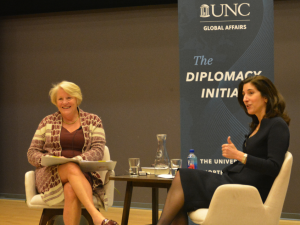Rana Foroohar Argues for a Post-Global Economy
April 11, 2023UNC Global Affairs

Rana Foroohar (right) and Barbara Stephenson (left) take questions during a Q&A. (Photo by Katie Costanza)
It’s time to start making decisions that create a form of capitalism that benefits everyone. That’s according to Rana Foroohar, Financial Times columnist and CNN analyst, who called for economic localization during a keynote held March 9 as part of the Global Research Institute conference on the future of global capitalism.
Foroohar’s talk covered the themes of her latest book, “Homecoming: The Path to Prosperity in a Post Global World,” where she counters the theory put forth by Thomas Friedman that the world is flat. Friedman’s theory, which asserts that money, goods and people can move seamlessly around the world and land where they will be most productive, is not accurate, said Foroohar, in part because it disregards place.
“This theory didn’t take into account that when a community is hurting, or when people are hurting, they’re actually less mobile. They’re less likely to leave because their community is what roots them and the family and the people around them.”
Foroohar believes that the paradigm of globalization is shifting. The future lies in economic localization, she said, and disruptions like the pandemic have demonstrated the need for solutions that prioritize economic resiliency over economic efficiency. Foroohar noted that when masks could not be imported from China because of supply chain disruption, North Carolina textile manufacturers pivoted to produce affordable personal protective equipment. This, she said, demonstrates the United States can adapt to challenges in a manner that’s competitive with China.
Peter Coclanis, Albert Ray Newsome Distinguished Professor of History and director of Carolina’s Global Research Institute, described Foroohar’s message as a call for a much more calibrated type of globalization going forward. “With globalization having moved into a new phase, we thought her new book, “Homecoming,” would be as provocative as it was timely,” said Coclanis. “In emphasizing the need for nations, including the U.S., to build economic resiliency rather than focus narrowly on economic efficiency, she makes a major contribution to contemporary debates.”
Foroohar’s talk was part of the Diplomatic Discussion series led by the Office of the Vice Provost for Global Affairs’ Diplomacy Initiative, and builds on previous conservations. In September, Fred Smith, founder of FedEx Corporation, spoke as part of the series and advocated for the U.S. to reassert its leadership of a stable world order by re-engaging in global trade agreements. “That system has been good for the U.S. and the world—maintaining peace and stability and creating economic opportunity,” said Smith. Sharing different perspectives on solving global challenges is one aim of Diplomatic Discussions.

“Foroohar raised important issues in her talk, not only about the importance of place and the impact of global trade on communities, but also about the impact of the U.S. dollar as the world’s reserve currency,” said Barbara Stephenson, vice provost for global affairs and former U.S. ambassador, who introduced Foroohar and led the fireside chat. “I hope to continue to bring diverse voices and perspectives to campus under the Diplomacy Initiative so that our students can grapple with the big global issues of our time.”
Jerome Roy, a UNC-Chapel Hill junior and political science major, was not only inspired by Faroohar’s talk to think critically, but he also recognized a message of hope.
“Today, with corporations coming together and consolidating, it seems like the little man is being stretched out from the global economy, so it was very good to hear how hopeful she was that things can change and that things can go, not go back to the way they were, but adapt to new ways of thinking.”
Foroohar predicts the next 40 years will focus on community resilience, more domestic production and innovation, and a new way to define and measure economic success.
“We talk about economics often in very dry terms,” said Foroohar “We talk about numbers, and we talk about policies. But really, economics is about people.”
